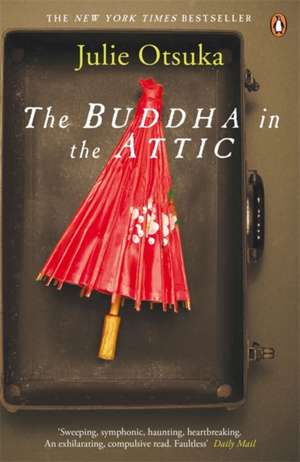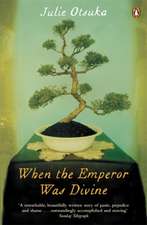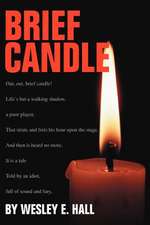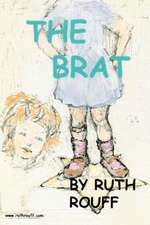The Buddha in the Attic
Autor Julie Otsukaen Limba Engleză Paperback – 6 feb 2013
Between the first and second world wars a group of young, non-English-speaking Japanese women travelled by boat to America. They were picture brides, clutching photos of husbands-to-be whom they had yet to meet. Julie Otsuka tells their extraordinary, heartbreaking story in this spellbinding and poetic account of strangers lost and alone in a new and deeply foreign land.
'Sweeping, symphonic, empathic . . . subtle, infinitely skilful . . . an exhilarating, compulsive read. Otsuka's haunting, heartbreaking conclusion, in the aftermath of Pearl Harbor, is faultless'Daily Mail
'A tender, nuanced, empathetic exploration of the sorrows and consolations of a whole generation of women . . . the distaff equivalent of a war memorial'Daily Telegraph
'A haunting and heartbreaking look at the immigrant experience . . . Otsuka's keenly observed prose manages to capture whole histories in a sweep of gorgeous incantatory sentences'Marie Claire
'An understated masterpiece... she conjures up the lost voices of a generation of Japanese American women without losing sight of the distinct experience of each'San Francisco Chronicle
Julie Otsuka was born and raised in California. She is the author of the novelWhen the Emperor Was Divine, and a recipient of the Asian American Literary Award, the American Library Association Alex Award, and a Guggenheim fellowship. Her second novel,The Buddha in the Attic, was nominated for the 2011 National Book Award. She lives in New York City.
| Toate formatele și edițiile | Preț | Express |
|---|---|---|
| Paperback (2) | 51.16 lei 25-31 zile | +15.72 lei 6-12 zile |
| Penguin Books – 6 feb 2013 | 51.16 lei 25-31 zile | +15.72 lei 6-12 zile |
| Anchor Books – 29 feb 2012 | 82.49 lei 22-36 zile | +16.87 lei 6-12 zile |
Preț: 51.16 lei
Preț vechi: 62.28 lei
-18% Nou
Puncte Express: 77
Preț estimativ în valută:
9.79€ • 10.18$ • 8.08£
9.79€ • 10.18$ • 8.08£
Carte disponibilă
Livrare economică 27 martie-02 aprilie
Livrare express 08-14 martie pentru 25.71 lei
Preluare comenzi: 021 569.72.76
Specificații
ISBN-13: 9780241956489
ISBN-10: 024195648X
Pagini: 144
Dimensiuni: 129 x 198 x 8 mm
Greutate: 0.11 kg
Editura: Penguin Books
Colecția Penguin
Locul publicării:London, United Kingdom
ISBN-10: 024195648X
Pagini: 144
Dimensiuni: 129 x 198 x 8 mm
Greutate: 0.11 kg
Editura: Penguin Books
Colecția Penguin
Locul publicării:London, United Kingdom
Notă biografică
Julie
Otsuka
was
born
and
raised
in
California.
She
is
the
author
of
the
novelWhenthe
Emperor
Was
Divine,
and
a
recipient
of
the
Asian
American
Literary
Award,
the
American
Library
Association
Alex
Award,
and
a
Guggenheim
fellowship.
Her
second
novel,The
Buddha
in
the
Attic,
was
nominated
for
the
2011
National
Book
Award.
She
lives
in
New
York
City.
Recenzii
Sweeping,
symphonic,
empathic
.
.
.
subtle,
infinitely
skilful
.
.
.
an
exhilarating,
compulsive
read.
Otsuka's
haunting,
heartbreaking
conclusion,
in
the
aftermath
of
Pearl
Harbor,
is
faultless
Paints a poignant, moving portrait of immigration by deftly weaving together a chorus of voices. Fascinating and tragic in equal measure
A tender, nuanced, empathetic exploration of the sorrows and consolations of a whole generation of women
A haunting and heartbreaking look at the immigrant experience . . . Otsuka's keenly observed prose manages to capture whole histories in a sweep of gorgeous incantatory sentences
Novels written in the first person plural are rare. It's a narrative device that givesThe Buddha in the Attica deliciously melancholy quality . . . Powerful, lyrical and almost unbearably sad
Powerfully moving . . . intensely lyrical . . . verges on the edge of poetry
The tone is often incantatory, and though the language is direct, unconvoluted, almost without metaphor, its true and very unusual merit lies, I think, in that indefinable quality we call poetry
A kind of collective memoir that squeezes volumes of experience into a small space . . . more than a history lesson because Otsuka compresses the individual emotions into one haunting story
Her trick is to sum up a few life story in a few tantalising sentences, moving on to the next at lightning speed. The result is panoramic, each line opening a window on to the world of one woman after another, pinpointing each one's hopes and happiness or misery and pain
Intriguing . . . fleeting, singular images pile up and reverberate against each other to strange, memorable effect
Spare but resonant, powerful, evocative
Spare and stunning . . . Otsuka has created a tableau as intricate as the pen strokes her humble immigrant girls learned to use in letters to loved ones they'd never see again
A delicate, heartbreaking portrait . . . beautifully rendered . . . Otsuka's prose is precise and rich with imagery. [Readers] will finish this exceptional book profoundly moved.
This chorus of narrators speaks in a poetry that is both spare and passionate, sure to haunt even the most coldhearted among us
A stunning feat of empathetic imagination and emotional compression, capturing the experience of thousands of women
A lithe stunner
To watchEmperorcatching on with teachers and students in vast numbers is to grasp what must have happened at the outset for novels likeLord of the FliesandTo Kill a Mockingbird
Paints a poignant, moving portrait of immigration by deftly weaving together a chorus of voices. Fascinating and tragic in equal measure
A tender, nuanced, empathetic exploration of the sorrows and consolations of a whole generation of women
A haunting and heartbreaking look at the immigrant experience . . . Otsuka's keenly observed prose manages to capture whole histories in a sweep of gorgeous incantatory sentences
Novels written in the first person plural are rare. It's a narrative device that givesThe Buddha in the Attica deliciously melancholy quality . . . Powerful, lyrical and almost unbearably sad
Powerfully moving . . . intensely lyrical . . . verges on the edge of poetry
The tone is often incantatory, and though the language is direct, unconvoluted, almost without metaphor, its true and very unusual merit lies, I think, in that indefinable quality we call poetry
A kind of collective memoir that squeezes volumes of experience into a small space . . . more than a history lesson because Otsuka compresses the individual emotions into one haunting story
Her trick is to sum up a few life story in a few tantalising sentences, moving on to the next at lightning speed. The result is panoramic, each line opening a window on to the world of one woman after another, pinpointing each one's hopes and happiness or misery and pain
Intriguing . . . fleeting, singular images pile up and reverberate against each other to strange, memorable effect
Spare but resonant, powerful, evocative
Spare and stunning . . . Otsuka has created a tableau as intricate as the pen strokes her humble immigrant girls learned to use in letters to loved ones they'd never see again
A delicate, heartbreaking portrait . . . beautifully rendered . . . Otsuka's prose is precise and rich with imagery. [Readers] will finish this exceptional book profoundly moved.
This chorus of narrators speaks in a poetry that is both spare and passionate, sure to haunt even the most coldhearted among us
A stunning feat of empathetic imagination and emotional compression, capturing the experience of thousands of women
A lithe stunner
To watchEmperorcatching on with teachers and students in vast numbers is to grasp what must have happened at the outset for novels likeLord of the FliesandTo Kill a Mockingbird
Extras
Come, Japanese!
On the boat we were mostly virgins. We had long black hair and flat wide feet and we were not very tall. Some of us had eaten nothing but rice gruel as young girls and had slightly bowed legs, and some of us were only fourteen years old and were still young girls ourselves. Some of us came from the city, and wore stylish city clothes, but many more of us came from the country and on the boat we wore the same old kimonos we'd been wearing for years-faded hand-me-downs from our sisters that had been patched and redyed many times. Some of us came from the mountains, and had never before seen the sea, except for in pictures, and some of us were the daughters of fishermen who had been around the sea all our lives. Perhaps we had lost a brother or father to the sea, or a fiancé, or perhaps someone we loved had jumped into the water one unhappy morning and simply swum away, and now it was time for us, too, to move on.
On the boat the first thing we did-before deciding who we liked and didn't like, before telling each other which one of the islands we were from, and why we were leaving, before even bothering to learn each other's names-was compare photographs of our husbands. They were handsome young men with dark eyes and full heads of hair and skin that was smooth and unblemished. Their chins were strong. Their posture, good. Their noses were straight and high. They looked like our brothers and fathers back home, only better dressed, in gray frock coats and fine Western three-piece suits. Some of them were standing on sidewalks in front of wooden A-frame houses with white picket fences and neatly mowed lawns, and some were leaning in driveways against Model T Fords. Some were sitting in studios on stiff high- backed chairs with their hands neatly folded and staring straight into the camera, as though they were ready to take on the world. All of them had promised to be there, waiting for us, in San Francisco, when we sailed into port.
On the boat, we often wondered: Would we like them? Would we love them? Would we recognize them from their pictures when we first saw them on the dock?
On the boat we slept down below, in steerage, where it was filthy and dim. Our beds were narrow metal racks stacked one on top of the other and our mattresses were hard and thin and darkened with the stains of other journeys, other lives. Our pillows were stuffed with dried wheat hulls. Scraps of food littered the passageways between berths and the floors were wet and slick. There was one porthole, and in the evening, after the hatch was closed, the darkness filled with whispers. Will it hurt? Bodies tossed and turned beneath the blankets. The sea rose and fell. The damp air stifled. At night we dreamed of our husbands. We dreamed of new wooden sandals and endless bolts of indigo silk and of living, one day, in a house with a chimney. We dreamed we were lovely and tall. We dreamed we were back in the rice paddies, which we had so desperately wanted to escape. The rice paddy dreams were always nightmares. We dreamed of our older and prettier sisters who had been sold to the geisha houses by our fathers so that the rest of us might eat, and when we woke we were gasping for air. For a second I thought I was her.
Our first few days on the boat we were seasick, and could not keep down our food, and had to make repeated trips to the railing. Some of us were so dizzy we could not even walk, and lay in our berths in a dull stupor, unable to remember our own names, not to mention those of our new husbands. Remind me one more time, I'm Mrs. Who? Some of us clutched our stomachs and prayed out loud to Kannon, the goddess of mercy-Where are you?-while others of us preferred to turn silently green. And often, in the middle of the night, we were jolted awake by a violent swell and for a brief moment we had no idea where we were, or why our beds would not stop moving, or why our hearts were pounding with such dread. Earthquake was the first thought that usually came to our minds. We reached out for our mothers then, in whose arms we had slept until the morning we left home. Were they sleeping now? Were they dreaming? Were they thinking of us night and day? Were they still walking three steps behind our fathers on the streets with their arms full of packages while our fathers carried nothing at all? Were they secretly envious of us for sailing away? Didn't I give you everything? Had they remembered to air out our old kimonos? Had they remembered to feed the cats? Had they made sure to tell us everything we needed to know? Hold your teacup with both hands, stay out of the sun, never say more than you have to.
Most of us on the boat were accomplished, and were sure we would make good wives. We knew how to cook and sew. We knew how to serve tea and arrange flowers and sit quietly on our flat wide feet for hours, saying absolutely nothing of substance at all. A girl must blend into a room: she must be present without appearing to exist. We knew how to behave at funerals, and how to write short, melancholy poems about the passing of autumn that were exactly seventeen syllables long. We knew how to pull weeds and chop kindling and haul water, and one of us-the rice miller's daughter-knew how to walk two miles into town with an eighty-pound sack of rice on her back without once breaking into a sweat. It's all in the way you breathe. Most of us had good manners, and were extremely polite, except for when we got mad and cursed like sailors. Most of us spoke like ladies most of the time, with our voices pitched high, and pretended to know much less than we did, and whenever we walked past the deckhands we made sure to take small, mincing steps with our toes turned properly in. Because how many times had our mothers told us: Walk like the city, not like the farm!
On the boat we crowded into each other's bunks every night and stayed up for hours discussing the unknown continent ahead of us. The people there were said to eat nothing but meat and their bodies were covered with hair (we were mostly Buddhist, and did not eat meat, and only had hair in the appropriate places). The trees were enormous. The plains were vast. The women were loud and tall-a full head taller, we had heard, than the tallest of our men. The language was ten times as difficult as our own and the customs were unfathomably strange. Books were read from back to front and soap was used in the bath. Noses were blown on dirty cloths that were stuffed back into pockets only to be taken out later and used again and again. The opposite of white was not red, but black. What would become of us, we wondered, in such an alien land? We imagined ourselves-an unusually small people armed only with our guidebooks-entering a country of giants. Would we be laughed at? Spat on? Or, worse yet, would we not be taken seriously at all? But even the most reluctant of us had to admit that it was better to marry a stranger in America than grow old with a farmer from the village. Because in America the women did not have to work in the fields and there was plenty of rice and firewood for all. And wherever you went the men held open the doors and tipped their hats and called out, "Ladies first" and "After you."
Some of us on the boat were from Kyoto, and were delicate and fair, and had lived our entire lives in darkened rooms at the back of the house. Some of us were from Nara, and prayed to our ancestors three times a day, and swore we could still hear the temple bells ringing. Some of us were farmers' daughters from Yamaguchi with thick wrists and broad shoulders who had never gone to bed after nine. Some of us were from a small mountain hamlet in Yamanashi and had only recently seen our first train. Some of us were from Tokyo, and had seen everything, and spoke beautiful Japanese, and did not mix much with any of the others. Many more of us were from Kagoshima and spoke in a thick southern dialect that those of us from Tokyo pretended we could not understand. Some of us were from Hokkaido, where it was snowy and cold, and would dream of that white landscape for years. Some of us were from Hiroshima, which would later explode, and were lucky to be on the boat at all though of course we did not then know it. The youngest of us was twelve, and from the eastern shore of Lake Biwa, and had not yet begun to bleed. My parents married me off for the betrothal money. The oldest of us was thirty-seven, and from Niigata, and had spent her entire life taking care of her invalid father, whose recent death made her both happy and sad. I knew I could only marry if he died. One of us was from Kumamoto, where there were no more eligible men-all of the eligible men had left the year before to find work in Manchuria-and felt fortunate to have found any kind of husband at all. I took one look at his photograph and told the matchmaker, "He'll do." One of us was from a silk-weaving village in Fukushima, and had lost her first husband to the flu, and her second to a younger and prettier woman who lived on the other side of the hill, and now she was sailing to America to marry her third. He's healthy, he doesn't drink, he doesn't gamble, that's all I needed to know. One of us was a former dancing girl from Nagoya who dressed beautifully, and had translucent white skin, and knew everything there was to know about men, and it was to her we turned every night with our questions. How long will it last? With the lamp lit or in the dark? Legs up or down? Eyes open or closed? What if I can't breathe? What if I get thirsty? What if he is too heavy? What if he is too big? What if he does not want me at all? "Men are really quite simple," she told us. And then she began to explain.
On the boat we sometimes lay awake for hours in the swaying damp darkness of the hold, filled with longing and dread, and wondered how we would last another three weeks.
On the boat we carried with us in our trunks all the things we would need for our new lives: white silk kimonos for our wedding night, colorful cotton kimonos for everyday wear, plain cotton kimonos for when we grew old, calligraphy brushes, thick black sticks of ink, thin sheets of rice paper on which to write long letters home, tiny brass Buddhas, ivory statues of the fox god, dolls we had slept with since we were five, bags of brown sugar with which to buy favors, bright cloth quilts, paper fans, English phrase books, flowered silk sashes, smooth black stones from the river that ran behind our house, a lock of hair from a boy we had once touched, and loved, and promised to write, even though we knew we never would, silver mirrors given to us by our mothers, whose last words still rang in our ears. You will see: women are weak, but mothers are strong.
On the boat we complained about everything. Bedbugs. Lice. Insomnia. The constant dull throb of the engine, which worked its way even into our dreams. We complained about the stench from the latrines-huge, gaping holes that opened out onto the sea-and our own slowly ripening odor, which seemed to grow more pungent by the day. We complained about Kazuko's aloofness, Chiyo's throat clearing, Fusayo's incessant humming of the "Teapicker's Song," which was driving us all slowly crazy. We complained about our disappearing hairpins-who among us was the thief?-and how the girls from first class had never once said hello from beneath their violet silk parasols in all the times they had walked past us up above on the deck. Just who do they think they are? We complained about the heat. The cold. The scratchy wool blankets. We complained about our own complaining. Deep down, though, most of us were really very happy, for soon we would be in America with our new husbands, who had written to us many times over the months. I have bought a beautiful house. You can plant tulips in the garden. Daffodils. Whatever you like. I own a farm. I operate a hotel. I am the president of a large bank. I left Japan several years ago to start my own business and can provide for you well. I am 179 centimeters tall and do not suffer from leprosy or lung disease and there is no history of madness in my family. I am a native of Okayama. Of Hyogo. Of Miyagi. Of Shizuoka. I grew up in the village next to yours and saw you once years ago at a fair. I will send you the money for your passage as soon as I can.
On the boat we carried our husbands' pictures in tiny oval lockets that hung on long chains from our necks. We carried them in silk purses and old tea tins and red lacquer boxes and in the thick brown envelopes from America in which they had originally been sent. We carried them in the sleeves of our kimonos, which we touched often, just to make sure they were still there. We carried them pressed flat between the pages of Come, Japanese! and Guidance for Going to America and Ten Ways to Please a Man and old, well-worn volumes of the Buddhist sutras, and one of us, who was Christian, and ate meat, and prayed to a different and longer-haired god, carried hers between the pages of a King James Bible. And when we asked her which man she liked better-the man in the photograph or the Lord Jesus Himself-she smiled mysteriously and replied, "Him, of course."
Several of us on the boat had secrets, which we swore we would keep from our husbands for the rest of our lives. Perhaps the real reason we were sailing to America was to track down a long-lost father who had left the family years before. He went to Wyoming to work in the coal mines and we never heard from him again. Or perhaps we were leaving behind a young daughter who had been born to a man whose face we could now barely recall-a traveling storyteller who had spent a week in the village, or a wandering Buddhist priest who had stopped by the house late one night on his way to Mt. Fuji.
From the Hardcover edition.
On the boat we were mostly virgins. We had long black hair and flat wide feet and we were not very tall. Some of us had eaten nothing but rice gruel as young girls and had slightly bowed legs, and some of us were only fourteen years old and were still young girls ourselves. Some of us came from the city, and wore stylish city clothes, but many more of us came from the country and on the boat we wore the same old kimonos we'd been wearing for years-faded hand-me-downs from our sisters that had been patched and redyed many times. Some of us came from the mountains, and had never before seen the sea, except for in pictures, and some of us were the daughters of fishermen who had been around the sea all our lives. Perhaps we had lost a brother or father to the sea, or a fiancé, or perhaps someone we loved had jumped into the water one unhappy morning and simply swum away, and now it was time for us, too, to move on.
On the boat the first thing we did-before deciding who we liked and didn't like, before telling each other which one of the islands we were from, and why we were leaving, before even bothering to learn each other's names-was compare photographs of our husbands. They were handsome young men with dark eyes and full heads of hair and skin that was smooth and unblemished. Their chins were strong. Their posture, good. Their noses were straight and high. They looked like our brothers and fathers back home, only better dressed, in gray frock coats and fine Western three-piece suits. Some of them were standing on sidewalks in front of wooden A-frame houses with white picket fences and neatly mowed lawns, and some were leaning in driveways against Model T Fords. Some were sitting in studios on stiff high- backed chairs with their hands neatly folded and staring straight into the camera, as though they were ready to take on the world. All of them had promised to be there, waiting for us, in San Francisco, when we sailed into port.
On the boat, we often wondered: Would we like them? Would we love them? Would we recognize them from their pictures when we first saw them on the dock?
On the boat we slept down below, in steerage, where it was filthy and dim. Our beds were narrow metal racks stacked one on top of the other and our mattresses were hard and thin and darkened with the stains of other journeys, other lives. Our pillows were stuffed with dried wheat hulls. Scraps of food littered the passageways between berths and the floors were wet and slick. There was one porthole, and in the evening, after the hatch was closed, the darkness filled with whispers. Will it hurt? Bodies tossed and turned beneath the blankets. The sea rose and fell. The damp air stifled. At night we dreamed of our husbands. We dreamed of new wooden sandals and endless bolts of indigo silk and of living, one day, in a house with a chimney. We dreamed we were lovely and tall. We dreamed we were back in the rice paddies, which we had so desperately wanted to escape. The rice paddy dreams were always nightmares. We dreamed of our older and prettier sisters who had been sold to the geisha houses by our fathers so that the rest of us might eat, and when we woke we were gasping for air. For a second I thought I was her.
Our first few days on the boat we were seasick, and could not keep down our food, and had to make repeated trips to the railing. Some of us were so dizzy we could not even walk, and lay in our berths in a dull stupor, unable to remember our own names, not to mention those of our new husbands. Remind me one more time, I'm Mrs. Who? Some of us clutched our stomachs and prayed out loud to Kannon, the goddess of mercy-Where are you?-while others of us preferred to turn silently green. And often, in the middle of the night, we were jolted awake by a violent swell and for a brief moment we had no idea where we were, or why our beds would not stop moving, or why our hearts were pounding with such dread. Earthquake was the first thought that usually came to our minds. We reached out for our mothers then, in whose arms we had slept until the morning we left home. Were they sleeping now? Were they dreaming? Were they thinking of us night and day? Were they still walking three steps behind our fathers on the streets with their arms full of packages while our fathers carried nothing at all? Were they secretly envious of us for sailing away? Didn't I give you everything? Had they remembered to air out our old kimonos? Had they remembered to feed the cats? Had they made sure to tell us everything we needed to know? Hold your teacup with both hands, stay out of the sun, never say more than you have to.
Most of us on the boat were accomplished, and were sure we would make good wives. We knew how to cook and sew. We knew how to serve tea and arrange flowers and sit quietly on our flat wide feet for hours, saying absolutely nothing of substance at all. A girl must blend into a room: she must be present without appearing to exist. We knew how to behave at funerals, and how to write short, melancholy poems about the passing of autumn that were exactly seventeen syllables long. We knew how to pull weeds and chop kindling and haul water, and one of us-the rice miller's daughter-knew how to walk two miles into town with an eighty-pound sack of rice on her back without once breaking into a sweat. It's all in the way you breathe. Most of us had good manners, and were extremely polite, except for when we got mad and cursed like sailors. Most of us spoke like ladies most of the time, with our voices pitched high, and pretended to know much less than we did, and whenever we walked past the deckhands we made sure to take small, mincing steps with our toes turned properly in. Because how many times had our mothers told us: Walk like the city, not like the farm!
On the boat we crowded into each other's bunks every night and stayed up for hours discussing the unknown continent ahead of us. The people there were said to eat nothing but meat and their bodies were covered with hair (we were mostly Buddhist, and did not eat meat, and only had hair in the appropriate places). The trees were enormous. The plains were vast. The women were loud and tall-a full head taller, we had heard, than the tallest of our men. The language was ten times as difficult as our own and the customs were unfathomably strange. Books were read from back to front and soap was used in the bath. Noses were blown on dirty cloths that were stuffed back into pockets only to be taken out later and used again and again. The opposite of white was not red, but black. What would become of us, we wondered, in such an alien land? We imagined ourselves-an unusually small people armed only with our guidebooks-entering a country of giants. Would we be laughed at? Spat on? Or, worse yet, would we not be taken seriously at all? But even the most reluctant of us had to admit that it was better to marry a stranger in America than grow old with a farmer from the village. Because in America the women did not have to work in the fields and there was plenty of rice and firewood for all. And wherever you went the men held open the doors and tipped their hats and called out, "Ladies first" and "After you."
Some of us on the boat were from Kyoto, and were delicate and fair, and had lived our entire lives in darkened rooms at the back of the house. Some of us were from Nara, and prayed to our ancestors three times a day, and swore we could still hear the temple bells ringing. Some of us were farmers' daughters from Yamaguchi with thick wrists and broad shoulders who had never gone to bed after nine. Some of us were from a small mountain hamlet in Yamanashi and had only recently seen our first train. Some of us were from Tokyo, and had seen everything, and spoke beautiful Japanese, and did not mix much with any of the others. Many more of us were from Kagoshima and spoke in a thick southern dialect that those of us from Tokyo pretended we could not understand. Some of us were from Hokkaido, where it was snowy and cold, and would dream of that white landscape for years. Some of us were from Hiroshima, which would later explode, and were lucky to be on the boat at all though of course we did not then know it. The youngest of us was twelve, and from the eastern shore of Lake Biwa, and had not yet begun to bleed. My parents married me off for the betrothal money. The oldest of us was thirty-seven, and from Niigata, and had spent her entire life taking care of her invalid father, whose recent death made her both happy and sad. I knew I could only marry if he died. One of us was from Kumamoto, where there were no more eligible men-all of the eligible men had left the year before to find work in Manchuria-and felt fortunate to have found any kind of husband at all. I took one look at his photograph and told the matchmaker, "He'll do." One of us was from a silk-weaving village in Fukushima, and had lost her first husband to the flu, and her second to a younger and prettier woman who lived on the other side of the hill, and now she was sailing to America to marry her third. He's healthy, he doesn't drink, he doesn't gamble, that's all I needed to know. One of us was a former dancing girl from Nagoya who dressed beautifully, and had translucent white skin, and knew everything there was to know about men, and it was to her we turned every night with our questions. How long will it last? With the lamp lit or in the dark? Legs up or down? Eyes open or closed? What if I can't breathe? What if I get thirsty? What if he is too heavy? What if he is too big? What if he does not want me at all? "Men are really quite simple," she told us. And then she began to explain.
On the boat we sometimes lay awake for hours in the swaying damp darkness of the hold, filled with longing and dread, and wondered how we would last another three weeks.
On the boat we carried with us in our trunks all the things we would need for our new lives: white silk kimonos for our wedding night, colorful cotton kimonos for everyday wear, plain cotton kimonos for when we grew old, calligraphy brushes, thick black sticks of ink, thin sheets of rice paper on which to write long letters home, tiny brass Buddhas, ivory statues of the fox god, dolls we had slept with since we were five, bags of brown sugar with which to buy favors, bright cloth quilts, paper fans, English phrase books, flowered silk sashes, smooth black stones from the river that ran behind our house, a lock of hair from a boy we had once touched, and loved, and promised to write, even though we knew we never would, silver mirrors given to us by our mothers, whose last words still rang in our ears. You will see: women are weak, but mothers are strong.
On the boat we complained about everything. Bedbugs. Lice. Insomnia. The constant dull throb of the engine, which worked its way even into our dreams. We complained about the stench from the latrines-huge, gaping holes that opened out onto the sea-and our own slowly ripening odor, which seemed to grow more pungent by the day. We complained about Kazuko's aloofness, Chiyo's throat clearing, Fusayo's incessant humming of the "Teapicker's Song," which was driving us all slowly crazy. We complained about our disappearing hairpins-who among us was the thief?-and how the girls from first class had never once said hello from beneath their violet silk parasols in all the times they had walked past us up above on the deck. Just who do they think they are? We complained about the heat. The cold. The scratchy wool blankets. We complained about our own complaining. Deep down, though, most of us were really very happy, for soon we would be in America with our new husbands, who had written to us many times over the months. I have bought a beautiful house. You can plant tulips in the garden. Daffodils. Whatever you like. I own a farm. I operate a hotel. I am the president of a large bank. I left Japan several years ago to start my own business and can provide for you well. I am 179 centimeters tall and do not suffer from leprosy or lung disease and there is no history of madness in my family. I am a native of Okayama. Of Hyogo. Of Miyagi. Of Shizuoka. I grew up in the village next to yours and saw you once years ago at a fair. I will send you the money for your passage as soon as I can.
On the boat we carried our husbands' pictures in tiny oval lockets that hung on long chains from our necks. We carried them in silk purses and old tea tins and red lacquer boxes and in the thick brown envelopes from America in which they had originally been sent. We carried them in the sleeves of our kimonos, which we touched often, just to make sure they were still there. We carried them pressed flat between the pages of Come, Japanese! and Guidance for Going to America and Ten Ways to Please a Man and old, well-worn volumes of the Buddhist sutras, and one of us, who was Christian, and ate meat, and prayed to a different and longer-haired god, carried hers between the pages of a King James Bible. And when we asked her which man she liked better-the man in the photograph or the Lord Jesus Himself-she smiled mysteriously and replied, "Him, of course."
Several of us on the boat had secrets, which we swore we would keep from our husbands for the rest of our lives. Perhaps the real reason we were sailing to America was to track down a long-lost father who had left the family years before. He went to Wyoming to work in the coal mines and we never heard from him again. Or perhaps we were leaving behind a young daughter who had been born to a man whose face we could now barely recall-a traveling storyteller who had spent a week in the village, or a wandering Buddhist priest who had stopped by the house late one night on his way to Mt. Fuji.
From the Hardcover edition.



























